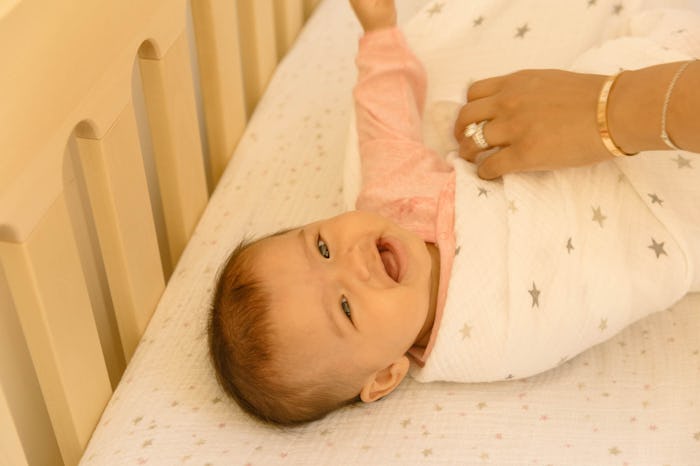Life
Here's Why Your Baby May Get More Ear Infections Than Others
Usually, when my younger daughter is feverish, tired, and complains of ear pain, I know she has an ear infection. She seems to develop an ear infection at least once or twice a year, so I know the doctor’s office drill of an ear check and antibiotics. The funny thing is that I don’t remember my older daughter ever having an ear infection, which makes me wonder if some babies are more susceptible to ear infections than others?
It turns out, some babies are in fact more likely to develop ear infections. In an interview with Romper, Pennsylvania pediatrician, Dr. Jarret Patton says that what puts a baby at risk involves their eustachian tubes. He explains that these are the tubes that ventilate the inner ear by connecting it to the back of the throat. “If the tubes are curvy or get blocked easily,” notes Patton, “they will be more likely to get filled with fluid that can’t drain, leading to an ear infection.”
Ear infections are usually prompted when your child has a cold or upper-respiratory infection, explained Parenting, and commonly appear when your baby is between four and six months of age. Your baby’s cold and congestion can cause the eustachian tubes to become inflamed. This creates a vacuum behind the eardrum where bacteria can breed, and this results in pain and swelling.
Children under the age of four are more likely to get ear infections, they noted, because their eustachian tubes are not yet in the downward sloping position they need to be in, and because their immature immune systems put them at a higher risk of catching an upper-respiratory infection.
But it’s not only those pesky eustachian tubes that put some children more at risk. According to KidsHealth, kids who spend time with other children in daycare are more susceptible to ear infections, because of their increased exposure to germs and viruses. They also mentioned that boys are more likely to get ear infections than girls, as are children who are bottle-fed. Another major factor that contributes to ear infections is the exposure to secondhand smoke. Ear, nose, and throat specialist, Dr. Michael Ferguson told WRAL, that secondhand smoke can irritate and inflame a child’s eustachian tubes, which can keep them from functioning and draining properly.
If your baby does have an ear infection, depending on the severity, your doctor may or may not prescribe antibiotics. If your child’s ear infection is accompanied by fever, pain, and is a true bacterial infection, then antibiotics will most likely be prescribed, explained Parents. But if the infection just looks like there's a lot of fluid built-up, your pediatrician may just suggest treating the pain. Oftentimes when my daughter had a mild ear infection, the doctor would suggest giving her Motrin and anesthetic ear drops for the pain, while waiting for the infection to clear itself up (which it often did).
There are steps you can take to prevent your baby from developing an ear infection. Patton says one thing you can try to reduce the possibility, is to avoid giving your baby a bottle while laying down at bedtime, because it can allow liquid to pool and inflame the eustachian tubes. Instead, try keeping baby on an angle when feeding, which can help the ears drain easily. You can also limit your baby’s exposure to other sick children, and make sure toys and surfaces are clean and sanitized.
As a mom who has seen numerous ear infections, I know that you'll see fewer as your child gets older. So with a little bit of patience and the correct treatment, hopefully you and your little one will get past this phase soon.
Check out Romper's new video series, Bearing The Motherload, where disagreeing parents from different sides of an issue sit down with a mediator and talk about how to support (and not judge) each other’s parenting perspectives. New episodes air Mondays on Facebook.
